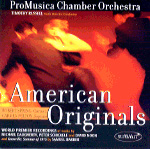[Peter Schickele is best known as the delightfully clever musical humorist, promoter, presenter, and curator of the works of PDQ Bach, the “last and least” of Johann Sebastian’s children. But he also was a more or less serious composer whose works are available on several recordings, including this one, which we offer as a repost from our archives, in memory and tribute following Schickele’s death on January 16, 2024.]
Three world premieres and a classic work that truly epitomizes the terms “American” and “original” make up a somewhat odd mix of selections for a CD program but that probably would work just fine in a concert setting. Peter Schickele’s Clarinet Concerto is an expectedly charming, entertaining, smartly written piece, agreeable, lighthearted, brimming with American-esque tunes and rhythms–and of course spiced with humor, often unexpectedly popping out of nowhere. And soloist Robert Spring easily sings and spins and caresses his lines, completely engaged in Schickele’s flowing, dancing melodies and deftly dispatching the work’s briefly challenging sections.
In Barber’s evocative masterpiece Knoxville: Summer of 1915 soprano Carmen Pelton sings the notes, but without much character, and whether intentional or not, her technique produces distractingly uneven variations of tone and timbre that never allow her narrative to settle into a comfortable, natural-sounding delivery. The orchestral sound actually overshadows her–and in fact, the playing is much more colorful and warmly expressive than her self-conscious if blandly pretty vocalizing.
But the main attraction here is Michael Daugherty’s Tell My Fortune, an intriguing “concerto for orchestra” whose three movements are concerned with colorful evocations of fortune-telling, specifically “Palm”, “Crystal”, and “Card”. How cleverly and successfully the composer illustrates these premises in his music is a matter for each listener to decide, but the originality of the ideas and the impact of the scoring is undeniably impressive and memorable–a work that’s guaranteed to stir audience approval, not to mention respect from orchestra players who get some really juicy solos.
Through all of this, conductor Timothy Russell masterfully and with impressive stylistic panache enlivens these scores, firing up his players while never sacrificing ensemble precision or artistic integrity. In other words, the music rings true and the performances are vibrant and engaging. So, aside from the mediocre Barber, if you want to hear fine renditions of works by some truly “original” American composers, here’s a truly unexpected treat–and it’s very well recorded, especially in the Daugherty, with its varied instrumental timbres and textures.
































